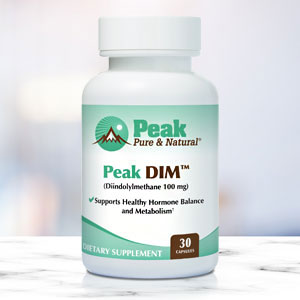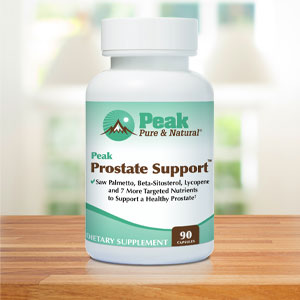Get Easy Health Digest™ in your inbox and don’t miss a thing when you subscribe today. Plus, get the free bonus report, Mother Nature’s Tips, Tricks and Remedies for Cholesterol, Blood Pressure & Blood Sugar as my way of saying welcome to the community!
Does low testosterone really increase COVID-19 severity?

After two and a half years with COVID-19, it looks like the worst is behind us.
However, the virus isn’t going anywhere. It looks like it’s here to stay, in one variation or another. Will they all be mild? Or is there another in our future that could even be harsher than the first one?
It’s hard to say, but at least researchers have been hard at work to see how any of us could avoid a bout so severe that we end up hospitalized.
For men, it could come down to their testosterone levels…
Low testosterone raises COVID-19 hospitalization risk
We reported in an earlier issue on at least one data review conducted by U.S. researchers that has revealed low serum testosterone levels could make it more likely for older men to have worse outcomes from COVID-19. It could also explain the higher coronavirus fatality rate among men compared to women.
However, that study didn’t determine whether low testosterone is a risk factor for severe COVID-19 or a result of it. So, the researchers undertook another study to answer that question.
In their second, more recent study, the researchers analyzed data from 723 men hospitalized in two major hospitals in the St. Louis area who tested positive for COVID-19, mostly in 2020 before vaccines were available. All these men had their testosterone levels measured between 2017 and 2021, either before or after they recovered from COVID-19.
Out of those 723 men, 427 had normal testosterone levels and 116 had low levels. An additional 180 men previously had low testosterone but were successfully treated with hormone replacement therapy, bringing their testosterone up to the normal range at the time they developed COVID-19.
Results indicate men with low testosterone who developed COVID-19 were 2.4 times more likely to need to be hospitalized than men with normal testosterone levels. Also, those men who were once diagnosed with low testosterone but received successful treatment had the same risk of hospitalization as men whose testosterone had always tested in the normal range.
Co-senior author Dr. Abhinav Diwan, a professor of medicine at Washington University School of Medicine in St. Louis, observes that up to a third of men over 30 have low testosterone. “Our study draws attention to this important risk factor and the need to address it as a strategy to lower hospitalizations,” he says.
According to the study’s findings, low testosterone should be considered an independent risk factor for COVID-19 hospitalization. Treating this condition could protect these men from severe disease and reduce the burden on hospitals during COVID-19 waves.
“Low testosterone turned out to be a risk factor for hospitalization from COVID, and treatment of low testosterone helped to negate that risk,” says co-senior author Dr. Sandeep Dhindsa, MD, an endocrinologist at Saint Louis University.
Hesitancy to treat low testosterone
Usually, men with low testosterone levels aren’t given hormone replacement until their quality of life is clearly impacted by their symptoms. These can include sexual dysfunction, low mood, irritability, memory and concentration problems, fatigue and loss of muscle strength.
The reason most doctors hesitate to treat mild testosterone deficiency is that testosterone therapy carries some health risks, such as an increased chance of developing heart disease.
“In the meantime, our study would suggest that it would be prudent to look at testosterone levels, especially in people who have symptoms of low testosterone, and then individualize care,” Diwan says. “If they are at really high risk of cardiovascular events, then the doctor could engage the patient in a discussion of the pros and cons of hormone replacement therapy, and perhaps lowering the risk of COVID hospitalization could be on the list of potential benefits.”
Still, if you’re a man, it’s always a good idea to take steps to protect your body’s testosterone levels, especially since they can decrease as you age.
If your physician is hesitant about hormone therapy, at the least there are steps you could take to keep your levels from further diminishing.
Getting exercise and following a healthy diet are both important steps to supporting testosterone. In fact, the keto diet was found to improve testosterone levels and improve testicular function.
Cruciferous vegetables like broccoli, cauliflower and Brussels sprouts are especially good for maintaining healthy testosterone levels. These foods contain a naturally-occurring compound called Di-Indole Methane, or DIM for short.
Dim helps fight another way testosterone is zapped: estrogen dominance. This issue is caused by xenoestrogens — hormone disruptors that you come in contact with every day in the form of plastics, personal care and household products, building supplies, pesticides and even foods, especially takeout foods. These slip into your body and mimic estrogen, throwing your natural male hormones out of balance.
You can double your protection against low testosterone and severe COVID-19 by maintaining healthy vitamin D levels. Make sure you’re getting enough of this crucial nutrient through sunlight, diet or supplements.
Editor’s note: There are perfectly safe and natural ways to decrease your risk of blood clots including the 25-cent vitamin, the nutrient that acts as a natural blood thinner and the powerful herb that helps clear plaque. To discover these and other secrets of long-lived hearts, click here for Hushed Up Natural Heart Cures and Common Misconceptions of Popular Heart Treatments!
Sources:
Low testosterone may increase risk of COVID-19 hospitalization for men — Washington University School of Medicine in St. Louis
Association of Male Hypogonadism With Risk of Hospitalization for COVID-19 — JAMA Network Open
Isolation and Precautions for People with COVID-19 — Centers for Disease Control and Prevention














